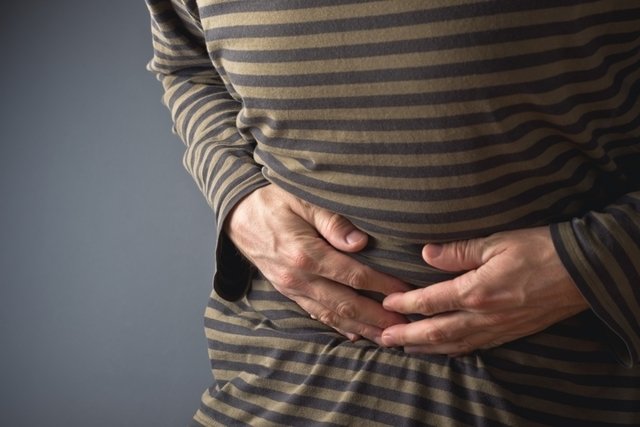Chronic appendicitis corresponds to the slow and progressive inflammation of the appendix, which is a small organ located on the right side of the abdomen. This situation normally occurs due to the process of progressive blockage of the organ by feces inside the appendix, resulting in strong and recurrent pain in the abdomen, which may or may not be accompanied by nausea and fever.
Although chronic and acute appendicitis are characterized by inflammation of the appendix, they are different. The difference between chronic and acute appendicitis is that chronic appendicitis affects few people, has a slow rate of progression and the symptoms are milder and acute appendicitis is very common, has a rapid rate of progression and the symptoms are intense. Learn more about acute appendicitis.

Chronic appendicitis symptoms
Symptoms of chronic appendicitis are only related to diffuse abdominal pain, but which can be stronger in the right region and lower abdomen, which persists for months and even years. Furthermore, strong and constant pain may or may not be accompanied by symptoms of acute appendicitis, such as nausea and fever. See what the symptoms of appendicitis are.
Chronic appendicitis is more common after the age of 40 due to dry stools and obstruction of the appendix. Therefore, it is important that routine exams are carried out, if there is a predisposition, so that chronic appendicitis is identified and treated.
How the diagnosis is made
The diagnosis of chronic appendicitis is difficult, as it normally does not generate other symptoms and the pain and inflammation can decrease with the use of analgesics and anti-inflammatories, making it easily confused with other diseases, such as gastroenteritis and diverticulitis, for example.
However, blood test, endoscopy and abdominal CT scan can help in diagnosing chronic appendicitis.
Treatment for chronic appendicitis
Treatment for chronic appendicitis is carried out according to the general practitioner’s guidance, and the use of medications to alleviate symptoms, such as analgesics, antipyretics, anti-inflammatories and antibiotics, is normally indicated if an infection is suspected.
However, the most effective treatment for chronic appendicitis is the removal of the appendix through a surgical procedure, as this makes it possible to eliminate the symptoms once and for all and prevent the recurrence of the disease and the rupture of the organ. Understand how surgery to remove the appendix is performed.

Sign up for our newsletter and stay up to date with exclusive news
that can transform your routine!
Warning: Undefined array key "title" in /home/storelat/public_html/wp-content/plugins/link-whisper-premium/templates/frontend/related-posts.php on line 12
Warning: Undefined array key "title_tag" in /home/storelat/public_html/wp-content/plugins/link-whisper-premium/templates/frontend/related-posts.php on line 13



